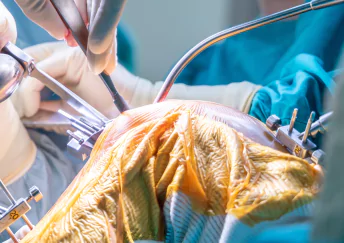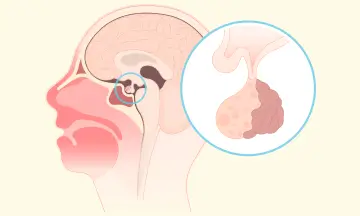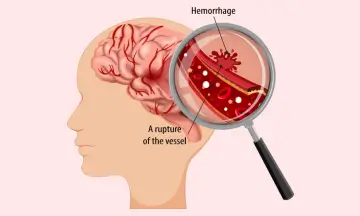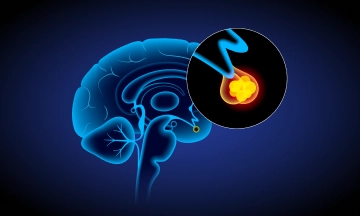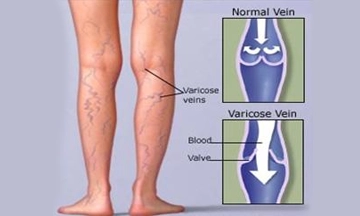What are Acoustic tumors?
Acoustic tumors are specialized tumors that arise from the sheath coating of the nerve responsible for hearing and balance. The correct neurosurgical name for them is Vestibular Schwannoma.
What are the common symptoms associated with Acoustic Neuroma?
- An early symptom is the loss of hearing in one ear:
- This can manifest in different ways. Either by the initial inability to understand the speech on telephone or inability to understand high pitched voices or tones.
- The main damage is to speech discrimination or understanding speech rather than just hearing it.
- Gradual loss of hearing will not improve on raising the voice. Shouting helps only when there is a problem in the conducting system in the ear. With a brain tumor, the hearing will not improve on raising the voice.
- Ringing in ears (Tinnitus).
- Feeling of fullness in the ears
- Vertigo or dizziness
- Facial numbness, weakness, and tingling
- Difficulty in swallowing
- Headache, clumsiness, and confusion.
- Difficulty in maintaining body balance
- Rarely, sudden loss of hearing
For further confirmation on Acoustic neuroma, the neurologist will recommend the following tests.
- Hearing test : The test will check hearing ability and determine whether the problem is associated with the nerve.
- MRI Scan (Magnetic resonance imaging)
How are Acoustic neuromas treated?
Acoustic neuromas are treated based on their growth, size, and location or position. The three modes of treatment for Acoustic neuromas are as follows:
- Monitoring the tumor
- Brain therapy
- Radiation therapy (stereotactic radiosurgery)
Monitoring the tumor
The acoustic tumors grow very slowly. Therefore, if detected early and are small, the doctor will just observe the progress of the tumor by doing MRI scans periodically. If the tumor grows in size, the doctor may recommend either surgery or radiotherapy.
Brain surgery
Surgery is the most popular and effective modality of treating this tumor. Surgery for vestibular schwannomas is widely practiced and, with the assistance of new technology, can bring about good healing as well as preservation of hearing as well as facial nerve function.
In the times of old, this surgery was associated with severe complications. It meant a complete loss of hearing, questionable balance issues, and a loss of the facial nerve, a nerve crucial for the symmetry and functioning of the muscles of the face. This nerve usually passes in close proximity to the tumor and was routinely sacrificed, causing debilitating eye and mouth issues as well as disfiguring asymmetry of the face.
Nowadays, with the advent of nerve stimulation as well as newer technologies, nerve damage can be limited to a minimum or sometimes even completely avoided. The implements that have helped immensely in the management of this surgery are:
- Nerve stimulator: This device can tell the operating surgeon about the location of the facial nerve, thereby preserving it
- Neuro-navigation: This transforms the MRI imaging taken before the surgery to a slice-by-slice real-time guidance of surgery. Neuro-navigation has transformed large, debilitating surgeries into precise day-care operations that benefit surgeon and patient alike.
- BERA: This allows the surgeon to monitor the effects of surgery on the hearing nerve as well as the vital centers of the brain responsible for hearing and heart activity.
All these implements are available at Sakra World Hospital. We also have an on-table CT scanner, which can be used to identify the status of tumor resection during surgery itself.
Radiation therapy
This modality is sometimes used alone or in conjunction with surgery. Radiation therapy uses radioactive elements to emit healing radiation that can destroy the tumor selectively, preserving the normal brain without damage. The most common type of radiation used is GAMMA KNIFE, where an extremely focused beam of radiation is used to shrink the tumor.
Despite the many modalities available for treatment, it will be your Neurosurgeon who will decide on the mode of treatment. Feel free to discuss the pros and cons of the procedures with them before you make a decision.
FAQs
Q1. How do you treat an acoustic brain tumor?
An acoustic brain tumor (also called acoustic neuroma or vestibular schwannoma) is treated based on its size, symptoms, and growth rate. Treatment options include:
- Observation (for small, slow-growing tumors)
- Surgery to remove the tumor
- Radiation therapy (like stereotactic radiosurgery) to stop or slow growth
A specialist will decide the best option based on hearing, balance, and overall health.
Q2. Can an acoustic neuroma grow back after surgery?
Yes, although it’s rare, an acoustic neuroma can grow back if it’s not fully removed. Regular MRI scans are recommended after surgery to monitor for recurrence.
Q3. How do you stop an acoustic neuroma from growing?
To stop the tumor from growing, doctors may use stereotactic radiosurgery (like Gamma Knife), which delivers precise radiation to the tumor. In some cases, surgery is done if the tumor is causing symptoms. Regular monitoring helps detect changes early.
Q4. What causes vestibular schwannomas?
Vestibular schwannomas are usually non-cancerous and arise from the Schwann cells on the balance nerve. The exact cause is unknown in most cases, but they can be linked to a genetic disorder called Neurofibromatosis Type 2 (NF2) in rare cases.
Q5. Is surgery for acoustic neuroma risky?
Surgery for acoustic neuroma is generally safe in experienced hands, but it can have risks like:
- Hearing loss
- Facial nerve damage
- Balance issues
- CSF leak or infection
Minimally invasive and nerve-monitoring techniques have made surgery safer and more effective.



